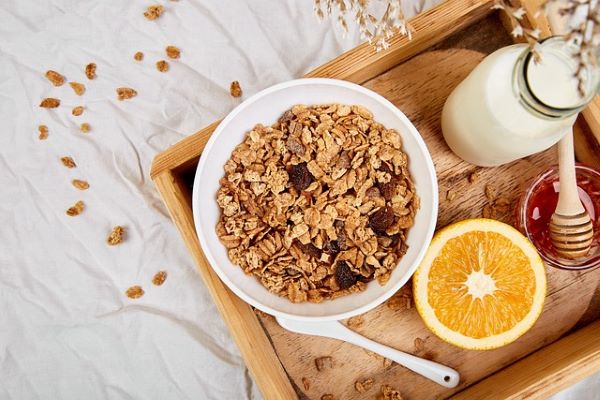Packaged Muesli is often marketed as the perfect healthy breakfast. It’s packed with fiber, nuts, dried fruits, and sometimes seeds, making it seem like a nutritious way to start your day. But here’s the catch: many store-bought muesli brands sneak in invert syrup, an added sugar that’s far from healthy.
If you’ve been having these ready-to-eat muesli every morning, assuming it’s fueling your body the right way, you might want to reconsider. What happens if you unknowingly consume invert syrup-laden muesli for 30 days straight? The results might shock you!
What is Invert Syrup, and Why Is It in Your Ready-to-Eat Muesli?
Invert syrup is a liquid sweetener made by breaking down sucrose into glucose and fructose. It’s commonly used in cereals, granola bars, and baked goods to retain moisture and enhance sweetness.
While food companies love invert syrup because it keeps products fresh and delicious, your body isn’t as enthusiastic about it. It is essentially another form of added sugar, which can have severe long-term health effects.
The Hidden Sugar in Your “Healthy” Packaged Muesli Breakfast
Many people eat muesli as a way to avoid sugary cereals, but ironically, muesli with invert syrup can contain just as much sugar as a bowl of processed cereal. According to health experts, the recommended daily sugar intake is:
- 25g (6 teaspoons) for women
- 36g (9 teaspoons) for men
Now, let’s break this down: A serving of packaged muesli with invert syrup can contain 10-15g of added sugar. If you pair it with flavored yogurt or fruit juice, you might be unknowingly consuming more than half of your daily sugar limit before 9 AM!
Also Read: 30 Days Without Added Sugars: How It Changes Your Energy Levels
What Happens When You Consume Invert Syrup for 30 Days?
1. Blood Sugar Spikes and Crashes
Since invert syrup is made up of glucose and fructose, it quickly raises your blood sugar levels. This means a short-term burst of energy followed by a crash, making you feel sluggish and craving more sugar.
Scientific Evidence: A study published in the American Journal of Clinical Nutrition found that diets high in added sugars lead to insulin resistance over time, increasing the risk of diabetes.
2. Increased Risk of Weight Gain
Excess sugar, especially in the form of fructose, is linked to weight gain. Unlike glucose, which can be used by every cell in your body, fructose is processed in the liver and is more likely to be stored as fat.
Study Insight: Research in the journal Obesity found that high fructose intake leads to more belly fat accumulation than glucose, making invert syrup a hidden enemy in weight management.
3. Liver Overload and Fatty Liver Disease
Your liver can only process so much sugar before it starts turning it into fat deposits. Regular consumption of added sugars, especially fructose-heavy sweeteners like invert syrup, puts extra stress on your liver, leading to non-alcoholic fatty liver disease (NAFLD).
Scientific Data: A study in The Journal of Hepatology linked high sugar intake with increased liver fat, which is a precursor to serious liver diseases.
4. Increased Risk of Heart Disease
You might not associate muesli with heart disease, but if it’s loaded with invert syrup, it can silently damage your heart health. Excess sugar intake is linked to higher triglyceride levels, inflammation, and increased bad cholesterol (LDL).
Heart Health Warning: The Journal of the American Medical Association found that people consuming more than 10% of their daily calories from added sugars had a 30% higher risk of heart disease.
5. Poor Gut Health and Digestive Issues
A healthy gut relies on a balanced diet. Added sugars, especially fructose, feed harmful gut bacteria, leading to bloating, gas, and digestive discomfort.
Research Findings: A study in Cell Metabolism found that high-sugar diets disrupt gut microbiota, which can increase inflammation and even contribute to mental health issues like anxiety and depression.
So, Should You Avoid Muesli Altogether?
Not necessarily! Muesli without added sugars and artificial sweeteners can still be a healthy breakfast choice. Here’s how to make your muesli truly healthy:
✅ Read Labels – Avoid packaged meusli brands with “invert syrup,” “glucose syrup,” or “corn syrup.”
✅ Make Your Own – Mix oats, nuts, seeds, and fresh fruits for natural sweetness or dates if you do not prefer mixing milk with fruits. (something that Ayurveda rejects wholeheartedly!)
✅ Choose Unsweetened Dairy or Plant-Based Milk – Avoid flavored versions with hidden sugars.
Also Read: The Effects of Going Sugar-Free for 30 Days
FAQs
1. What’s the difference between invert syrup and regular sugar?
Invert syrup is a processed form of sugar where sucrose is broken down into glucose and fructose. This makes it sweeter and more rapidly absorbed into the bloodstream than regular sugar.
2. Can I eat muesli without worrying about sugar?
Yes, as long as you choose a no-added-sugar version or make your own at home using wholesome ingredients.
3. How much sugar is too much?
The American Heart Association recommends no more than 25g of added sugar per day for women and 36g for men. A single serving of store-bought muesli can take up half or more of your daily limit.
4. Are there healthier alternatives to invert syrup?
Yes! Natural sweeteners like honey, maple syrup, or mashed bananas can provide sweetness without harmful additives.
5. What if I already ate invert syrup-laden muesli for months?
It’s never too late to make a change. Cutting down on added sugars can improve your energy levels, digestion, and overall health in just a few weeks.
Conclusion: Make the Right Choice for Your Health
If you’ve been eating packaged muesli with invert syrup every day, it’s time to rethink your breakfast choices. The long-term impact of added sugars can affect your metabolism, liver, and heart. Opt for a clean, homemade version of muesli to ensure you’re truly nourishing your body.
Your breakfast should fuel you—not fool you!





